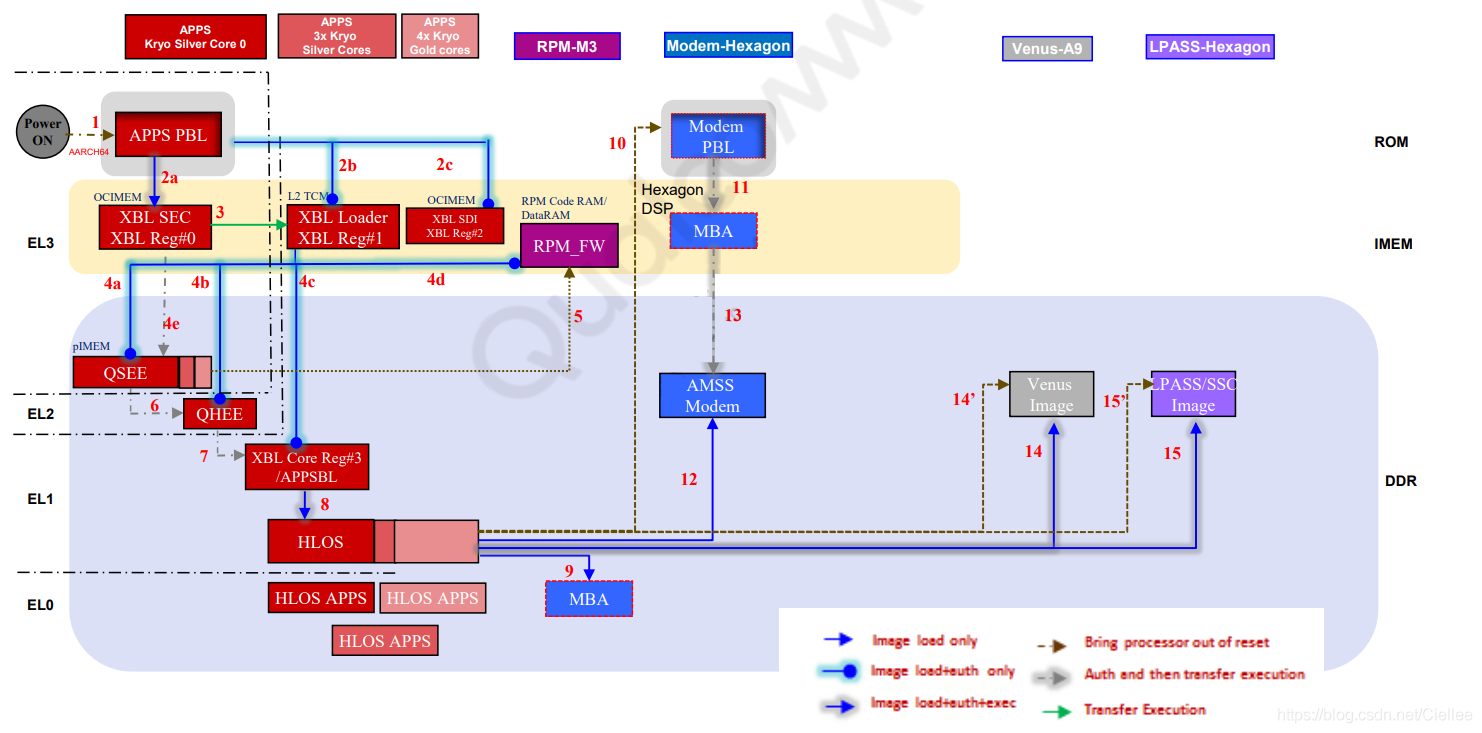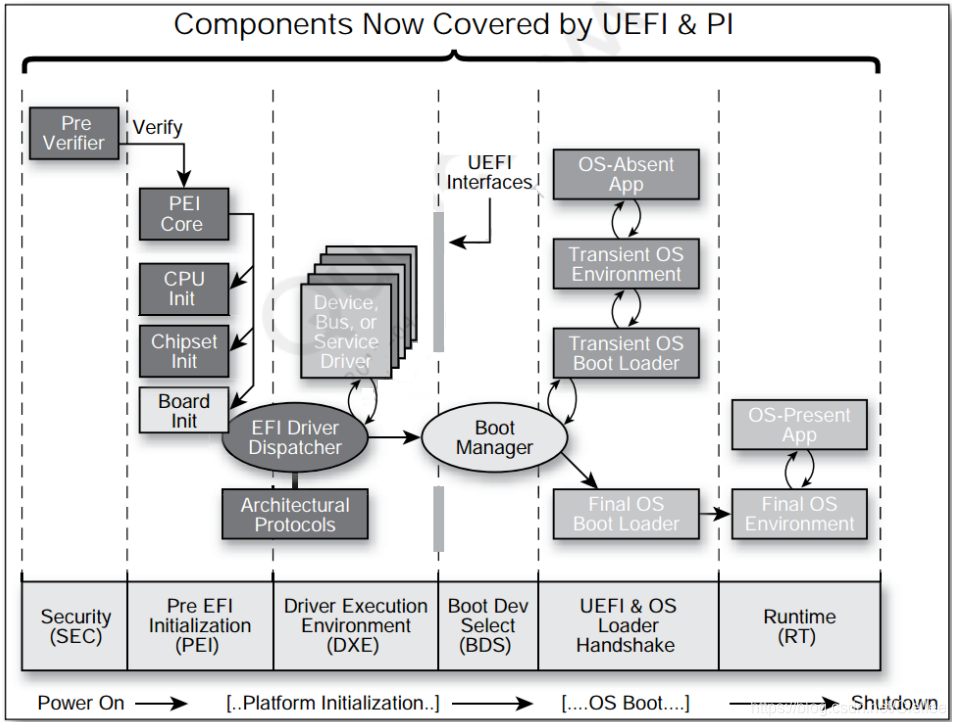高通Android UEFI XBL 代码流程分析
背景
之前学习的lk阶段点亮LCD的流程算是比较经典,但是高通已经推出了很多种基于UEFI方案的启动架构。
所以需要对这块比较新的技术进行学习。在学习之前,有必要了解一下高通UEFI启动流程。
原文(有删改):https://blog.csdn.net/Ciellee/article/details/113519478
参考文档:80_P2484_117_B_UEFI_With_XBL_On_MSM8998_SDM660_SDM
总览
先来看下SDM660芯片冷启动的流程。可以看出,在设备上电后,先跑的是 APPS PBL,接着运行XBL SEC、XBL Loader,通过Loader引出XBL CORE APPSBL,最后进入HLOS。

我们来看下这几个涉及的模块大概功能:
1、Application primary boot loader (APPS PBL)
PBL 启动时,CPU只开启了第一个核心 CPU Core 0,运行固件在ROM中,这部分是高通写死在芯片中的固件,外部开发人员是无法修改这部份的。
主要功能为:
(1)系统安全环境的初始化,以确保后续的XBL中的APPS 能够正常运行。
(2)根据boot gpio的配置选择从什么设备启动操作系统(如 Nand,USB等)。
(3)通过检测GPIO判断是否进入Emergency Download mode,用户可以通过FILE来下载完整的系统镜像。
(4)通过L2 TCM来加载XBL1 ELF,OCIMEM 和 RPM CodeRAM 代码。
2、Extensible boot loader (XBL)
从XBL开始,跑的就是我们编译下载进eMMC/UFS的系统镜像了,在XBL中主要是初始化相关的硬件环境,及代码安全环境。
(1)初始化 Buses、DDR、Clocks、CDT,启动QSEE,QHEE,RPM_FW, XBL core images。
(2)使能memory dump through USB and Sahara(系统死机时memory dump),看门狗,RAM dump to SD support等功能。
(3)初始化 USB驱动,USB充电功能,温升检测,PMIC驱动初始化,和 DDR training模块。
3、XBL core (UEFI or LK,ABL)
XBL core,就是之前的bootloader,主要功能就是初始化display驱动,提供fastboot功能,引导进入HLOS kernel操作系统。
注意,在ABL中,同样也只有CPU Core0在工作,其他的CPU核以是在进入HLOS Kernel后才开始初始化启用的。
本文中,我们重点关注的是Extensible boot loader (XBL),主要来学学UEFI XBL架构,及UEFI XBL代码流程。
一、UEFI XBL
代码目录分析
UEFI XBL代码路径位于:BOOT.XF.1.4\boot_images\
# BOOT.XF.1.4\boot_images
ArmPkg ----> ARM 架构相关的Protocols
ArmPlatformPkg ----> ARM 开发板相关的UEFI代码
BaseTools ----> 编译EDK和EDK2相关的工具,如
EmbeddedPkg ---->
FatPkg
IntelFrameworkModulePkg
IntelFrameworkPkg
MdeModulePkg
MdePkg
QcomPkg ----> 高通定制的相关pkg,如display和usb充电都在里面
ShellPkg ----> UEFI shell 环境
UEFI代码运行流程
从图中可以看出,UEFI代码运行流程为:
SEC(安全验证)--->PEI(EFI前期初始化)--->DXE(驱动执行环境)--->BDS(启动设备选择)--->UEFI Loader(操作系统加载前期)--->RT(Run Time)。
接下来,我们根据这个流程来分析下UEFI代码。

SEC (安全验证)
SEC的汇编代码入口位于:
BOOT.XF.1.4\boot_images\QcomPkg\XBLCore\AARCH64\ModuleEntryPoint.masm的 _ModuleEntryPoint中
入口汇编代码分析
分析看看ModuleEntryPoint.masm 这个文件
该汇编代码中,主要工作为:
1、关闭所有中断
2、关闭MMU和Caches
3、关闭TLB缓存表
4、获得当前运行的安全环境:EL1、EL2、EL3
5、初始化ELX 安全环境
6、使能 Cache
7、初始化栈
8、调用 CEntryPoint,传参 _StackBase(0x80C00000)、_StackSize(0x00040000)
#include <AsmMacroIoLibV8.h>
#include <Base.h>
#include <Library/PcdLib.h>
#include <AutoGen.h>
AREA |.text|,ALIGN=8,CODE,READONLY
# BOOT.XF.1.4\boot_images\QcomPkg\XBLCore\AARCH64\ModuleEntryPoint.masm
IMPORT CEntryPoint // 导入CEntryPoint()函数
EXPORT _ModuleEntryPoint // 输出 _ModuleEntryPoint段
IMPORT InitStackCanary // 导入InitStackCanary()函数 初始化栈
IMPORT ArmDisableInterrupts // 导入ArmDisableInterrupts()函数 禁用arm 中断
IMPORT ArmDisableCachesAndMmu // 导入ArmDisableCachesAndMmu()函数 禁用cache, mmu
IMPORT ArmWriteCptr
IMPORT ArmWriteHcr
IMPORT ArmWriteVBar
EXPORT _StackBase // 输出栈起始地址,起始地址为:0x80C00000
EXPORT _StackSize // 输出栈大小,栈大小为 0x00040000,256k
EXPORT CNTFRQ // 输出时钟频率,19200000
//定义于: BOOT.XF.1.4\boot_images\QcomPkg\Sdm660Pkg\Common\Sdm660Pkg_Loader.dsc
_StackBase
dcq FixedPcdGet64(PcdPrePiStackBase)
_StackSize
dcq FixedPcdGet64(PcdPrePiStackSize)
CNTFRQ
dcq FixedPcdGet32(PcdArmArchTimerFreqInHz)
_ModuleEntryPoint
mov x0, #0
// 1、关闭所有中断 /* First ensure all interrupts are disabled */
bl ArmDisableInterrupts
// 2、关闭MMU和Caches /* Ensure that the MMU and caches are off */
bl ArmDisableCachesAndMmu
// 3、关闭TLB缓存表 /* Invalidate Instruction Cache and TLB */
bl ArmInvalidateInstructionCache
bl ArmInvalidateTlb
// 4、获得当前运行的安全环境:EL1、EL2、EL3
/* Get current EL in x0 */
EL1_OR_EL2_OR_EL3(x0)
// CurrentEL : 0xC = EL3; 8 = EL2; 4 = EL1
// This only selects between EL1 and EL2 and EL3, else we die.
// Provide the Macro with a safe temp xreg to use.
//mrs x0, CurrentEL
cmp x0, #0xC // 比较 x0寄存器是否为 0xc,如果是跳转到 标签3
beq %F3
cmp x0, #0x8 // 比较 x0寄存器是否为 0x8,如果是跳转到 标签2
beq %F2
cmp x0, #0x4 // 比较 x0寄存器是否为 0x4
bne 、 // We should never get here
// EL1 code starts here
1 beq _Start
2 beq _Start // 如果当前是 EL2,直接跳转到_Start
/* Do not trap any access to Floating Point and Advanced SIMD in EL3、*/
/* Note this works only in EL3, x0 has current EL mode */
3 mov x0, #0
bl ArmWriteCptr // 如果当前是 EL3,直接跳转到ArmWriteCptr
// msr cptr_el3, x0 // EL3 Coprocessor Trap Reg (CPTR)
// 5、初始化ELX 安全环境
_SetupELx
mov x0, #0x30 /* RES1 */ // x0 = 0x30
orr x0, x0, #(1 << 0) /* Non-secure bit */ // 使能第0位为1
orr x0, x0, #(1 << 8) /* HVC enable */ // 使能第8位为1
orr x0, x0, #(1 << 10) /* 64-bit EL2 */ // 使能第10位为1
msr scr_el3, x0 // 配置通用寄存器 scr_el3 为-
msr cptr_el3, xzr /* Disable copro、traps to EL3 */
ldr x0, CNTFRQ
//msr cntfrq_el0, x0
msr sctlr_el2, xzr
.......省略一部分代码.......
// 6、使能 Cache
_EnableCache
#ifdef PRE_SIL
LoadConstantToReg (FixedPcdGet32(PcdSkipEarlyCacheMaint), x0)
cmn x0, #0
b.ne _PrepareArguments
#endif
bl ArmInvalidateDataCache
bl ArmEnableInstructionCache
bl ArmEnableDataCache
// 7、初始化栈
_PrepareArguments
/* Initialize Stack Canary */
bl InitStackCanary
// 8、调用 CEntryPoint,传参 _StackBase(0x80C00000)、_StackSize(0x00040000)
/* x0 = _StackBase and x1 = _StackSize */
ldr x0, _StackBase /* Stack base arg0 */
ldr x1, _StackSize /* Stack size arg1 */
bl CEntryPoint
初始化C运行环境
前面汇编代码中主要目的是初始化C运行环境,初始化栈,以便可以调C代码运行。
SEC的C代码入口位于: BOOT.XF.1.4\boot_images\QcomPkg\XBLCore\Sec.c的 CEntryPoint 中
/** Entry point
@param StackBase pointer to the stack base
@param StackSize stack size
**/
VOID CEntryPoint (IN VOID *StackBase,IN UINTN StackSize){
UefiDebugModeEntry(); // 如果支待jtag调试的话,此处会循环等待,直到debug指向的地址匹配
TargetEarlyInit()
Main (StackBase, StackSize); //进入main函数,传参 _StackBase(0x80C00000)、_StackSize(0x00040000)
}
接下来,我们进入 main函数分析下:
VOID Main (IN VOID *StackBase, IN UINTN StackSize){
// 1、获得fdf文件所在的地址,fdf可以说是UEFI的配置文件,
// 在fdf文件中包含所有的inf文件所在路径,及相关的bmp图片资源路径,以及相关的cfg配置文件路径。
// ## FD Base offset (refer to .fdf for FD size)
UefiFdBase = FixedPcdGet64(PcdEmbeddedFdBaseAddress); // 0x80200000
SecHeapMemBase = UefiFdBase + SEC_HEAP_MEM_OFFSET; // 0x300000
HobStackSize = StackSize;
// 2、初始化栈
InitStackCanary();
// 3、启动定时器周期计数
StartCyclCounter ();
// 4、初始化UART,主要是serial port端口初始化,及 serial buffer初始化 /* Start UART debug output */
UartInit();
// 5、打印"UEFI Start" 串口信息
PrintUefiStartInfo();
// 6、初始化CPU异常处理入口
InitializeCpuExceptionHandlers (NULL);
// 7、打印从开机到现在的时间差
PrintTimerDelta();
// 8、如果支持的话,启动程序流预测 /* Enable program flow prediction, if supported */
ArmEnableBranchPrediction ();
// 9、/* Initialize Info Block */
UefiInfoBlkPtr = InitInfoBlock (UefiFdBase + UEFI_INFO_BLK_OFFSET);
UefiInfoBlkPtr->StackBase = StackBase;
UefiInfoBlkPtr->StackSize = StackSize;
// 10、初始化 RAM 分区表,起始地址0x80000000,内存大小512M,检查地址是否非法,是否可正常访问
InitRamPartitionTableLib ();
ValidateFdRegion(UefiFdBase);
//TODO: Move this to ACPI-specific location
InitializeFBPT();
/* Get nibble from random value to adjust SEC heap */
SecHeapAslrVal = AslrAdjustRNGVal(ASLR_HEAP_RNG_BITS);
// 11、初始化hoblist,有关hob可参考:https://blog.csdn.net/z190814412/article/details/85330324
InitHobList(SecHeapMemBase,SEC_HEAP_MEM_SIZE - (SecHeapAslrVal*ASLR_HEAP_ALIGN), UefiInfoBlkPtr);
/* Add the FVs to the hob list */
BuildFvHob (PcdGet64(PcdFlashFvMainBase), PcdGet64(PcdFlashFvMainSize));
// 12、打印RAM 分区信息
/* Should be done after we have setup HOB for memory allocation */
PrintRamPartitions ();
// 13、初始化cache
Status = EarlyCacheInit (UefiFdBase, UEFI_FD_SIZE);
// 14、加载并解析 uefiplat.cfg平台配置文件,/* Load and Parse platform cfg file, cache re-initialized per cfg file */
Status = LoadAndParsePlatformCfg();
// 15、更新系统内存区相关信息 /* Add information from all other memory banks */
Status = UpdateSystemMemoryRegions();
Status = InitCacheWithMemoryRegions();
// 16、初始化所有的共享库 /* All shared lib related initialization */
// 初始化的lib源码位于 BOOT.XF.1.4\boot_images\QcomPkg\Sdm660Pkg\Library\
// 配置文件位于 BOOT.XF.1.4\boot_images\QcomPkg\Sdm660Pkg\LA\Sdm660Pkg_Core.dsc
Status = InitSharedLibs();
InitDbiDump();
// 17、获得DXE Heap堆内存信息,/* Look for "DXE Heap" memory region in config file */
Status = GetMemRegionInfoByName("DXE Heap", &DxeHeapMemInfo);
/* Get nibble from random value to adjust DXE heap */
DxeHeapAslrVal = AslrAdjustRNGVal(ASLR_HEAP_RNG_BITS);
/* Re-initialize HOB to point to the DXE Heap in CFG */
ReInitHobList(DxeHeapMemInfo.MemBase,
DxeHeapMemInfo.MemSize - (DxeHeapAslrVal*ASLR_HEAP_ALIGN),
UefiInfoBlkPtr);
// 18、初始化分页池缓存区
/* Now we have access to bigger pool, move pre-pi memory allocation pool to it */
ReInitPagePoolBuffer ();
// 19、创建Stack、CPU Hob信息
BuildStackHob ((EFI_PHYSICAL_ADDRESS)StackBase, HobStackSize);
BuildCpuHob (PcdGet8 (PcdPrePiCpuMemorySize), PcdGet8 (PcdPrePiCpuIoSize));
// 20、打印早期信息
DisplayEarlyInfo();
AddMemRegionHobs ();
/* Start perf here, after timer init, start at current tick value */
InitPerf();
/* SEC phase needs to run library constructors by hand */
ExtractGuidedSectionLibConstructor ();
LzmaDecompressLibConstructor ();
ZlibDecompressLibConstructor ();
/* Build HOBs to pass up our Version of stuff the DXE Core needs to save space */
BuildPeCoffLoaderHob ();
BuildExtractSectionHob (
&gLzmaCustomDecompressGuid,
LzmaGuidedSectionGetInfo,
LzmaGuidedSectionExtraction
);
BuildExtractSectionHob (
&gZlibDecompressGuid,
ZlibGuidedSectionGetInfo,
ZlibGuidedSectionDecompress
);
/* Check PRODMODE flag */
ProdmodeInfo = PRODMODE_ENABLED;
/* Build HOB to pass up prodmode info for security applications */
BuildGuidDataHob (&gQcomProdmodeInfoGuid, &ProdmodeInfo, sizeof(BOOLEAN));
UefiStartTime = ConvertTimerCountms(gUEFIStartCounter);
BuildGuidDataHob (&gEfiStartTimeHobGuid, &UefiStartTime, sizeof(UINT32));
/* Assume the FV that contains the SEC (our code) also contains a compressed FV */
DecompressFirstFv ();
/* Any non-critical initialization */
TargetLateInit();
/* Build memory allocation HOB for FV2 type
Need to remove for decompressed image */
BuildMemHobForFv(EFI_HOB_TYPE_FV2);
/* Load the DXE Core and transfer control to it */
LoadDxeCoreFromFv (NULL, 0);
/* DXE Core should always load and never return */
ASSERT (FALSE);
CpuDeadLoop();
}
1、获得fdf文件所在的地址,
在fdf文件中包含所有的inf文件所在路径,及相关的bmp图片资源路径,以及相关的cfg配置文件路径。
fdf可以说是UEFI的配置文件。
2、初始化栈
3、启动定时器周期计数
4、初始化UART,主要是serial port端口初始化,及 serial buffer初始化
5、打印"UEFI Start" 串口信息
6、初始化CPU异常处理入口
7、打印从开机到现在的时间差
8、如果支持的话,启动程序流预测 /* Enable program flow prediction, if supported */
9、Initialize Info Block
10、初始化 RAM 分区表,起始地址0x80000000,内存大小512M,检查地址是否非法,是否可正常访问
11、初始化hoblist,有关hob可参考:https://blog.csdn.net/z190814412/article/details/85330324
12、打印RAM 分区信息
13、初始化cache
14、加载并解析 uefiplat.cfg平台配置文件
15、更新系统内存区相关信息 /* Add information from all other memory banks */
16、初始化所有的共享库 /* All shared lib related initialization */
初始化的lib源码位于 BOOT.XF.1.4\boot_images\QcomPkg\Sdm660Pkg\Library
配置文件位于 BOOT.XF.1.4\boot_images\QcomPkg\Sdm660Pkg\LA\Sdm660Pkg_Core.dsc
17、获得DXE Heap堆内存信息,/* Look for “DXE Heap” memory region in config file */
18、初始化分页池缓存区
19、创建Stack、CPU Hob信息
20、打印早期信息
PEI (EFI前期初始化)
BOOT.XF.1.4\boot_images\MdeModulePkg\Core\Pei\PeiMain\PeiMain.c的 PeiCore 函数中
DXE (驱动执行环境)
DXE的加载位置在:
BOOT.XF.1.4\boot_images\EmbeddedPkg\Library\PrePiLib\PrePiLib.c的 LoadDxeCoreFromFv中
DXE的入口代码位于:
BOOT.XF.1.4\boot_images\MdeModulePkg\Core\Dxe\DxeMain\DxeMain.c的 DxeMain中
BDS (启动设备选择)
代码位于:
BOOT.XF.1.4\boot_images\QcomPkg\Drivers\BdsDxe\BdsEntry.c 的 BdsEntry 中
代码位于:
BOOT.XF.1.4\boot_images\QcomPkg\Drivers\QcomBds\QcomBds.c 的 BdsEntry 中
XBL Loader
代码位于:
BOOT.XF.1.4\boot_images\QcomPkg\XBLLoader\boot_loader.c
RT(Run Time)
代码位于:
BOOT.XF.1.4\boot_images\MdeModulePkg\Core\RuntimeDxe\Runtime.c的 RuntimeDriverInitialize 中
若在页首无特别声明,本篇文章由 Schips 经过整理后发布。
博客地址:https://www.cnblogs.com/schips/



 浙公网安备 33010602011771号
浙公网安备 33010602011771号